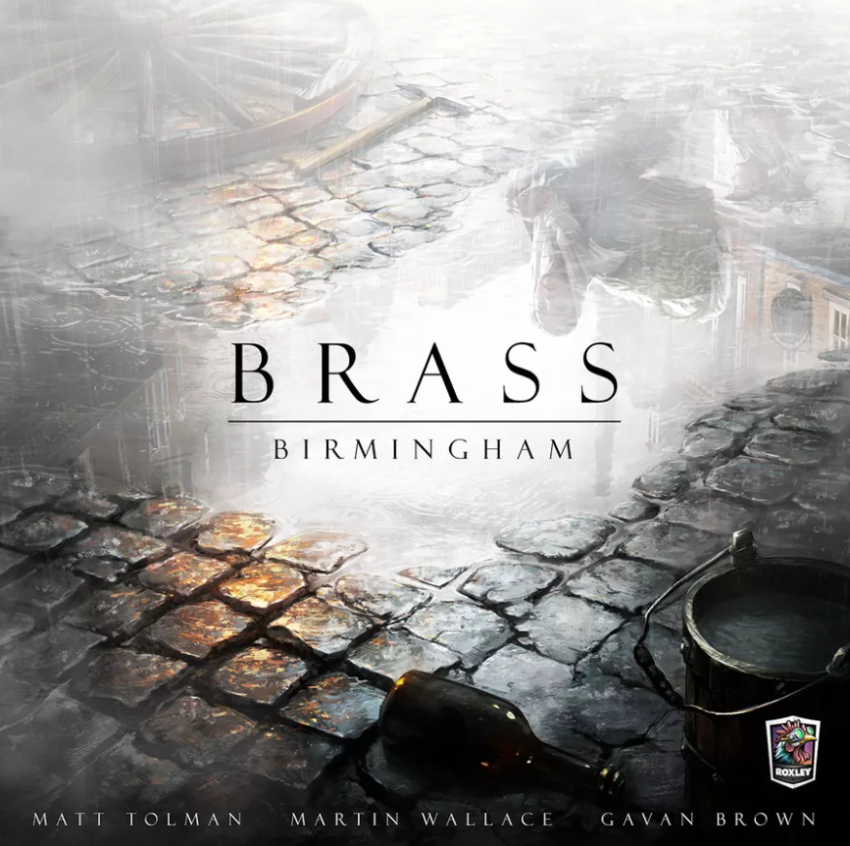Brass: Birmingham takes you to the industrial heart of England during the Industrial Revolution, a time of intense economic growth and rivalry. As an ambitious entrepreneur, you’ll build a network of canals, develop industries, and trade goods to establish yourself as a dominant force in this new age. The game captures the grit and complexity of economic expansion, with players striving to outmaneuver one another by building coal mines, ironworks, breweries, and cotton mills across the Midlands.
This economic engine-building game blends strategic depth with cutthroat competition, as every action affects the opportunities available to other players. The board itself is a network of locations connected by canals and railways, and your job is to find the most lucrative way to connect, produce, and sell. Brass: Birmingham emphasizes strategic planning, tight resources, and efficient use of limited actions, making each decision feel weighty.
Pros:
- Deep Strategic Gameplay: Brass: Birmingham rewards thoughtful planning. You must manage resources carefully, adapt to market fluctuations, and adjust to opponents’ moves. This makes it satisfying for players who enjoy complex games with layers of decision-making.
- Engaging Economic Mechanics: The interdependency of coal, iron, and breweries with various industrial developments creates a fascinating economic ecosystem. The need to buy, sell, and even share resources makes each player’s network feel interconnected.
- Balanced Mix of Competition and Cooperation: While the game is competitive, players can benefit from each other’s networks, which introduces cooperative elements. For instance, one player’s canal or rail network can be used by others to transport resources, which keeps players indirectly engaged with each other’s moves.
- Excellent Production Quality: The game components are high-quality and thematic, with a beautifully illustrated board and satisfying iron-clay poker chips in deluxe versions. This makes the experience immersive and elevates the tactile appeal of gameplay.
- Replayability with Variable Setup: Each game starts with different city demands and unique player strategies, creating a dynamic experience that feels fresh with each play. This variability, coupled with the depth of strategy, makes Brass: Birmingham highly replayable.
Cons:
- Steep Learning Curve: The rules, especially around resource management and network building, can feel overwhelming at first. New players may struggle with understanding when and how to optimize their actions, which can be daunting without a patient teacher.
- Lengthy Playtime: Brass: Birmingham often takes around 2-3 hours to complete, especially with newer players. The long playtime can deter casual gamers and requires a time commitment that not every game group can manage regularly.
- High Player Interaction May Lead to Frustration: The shared resources and tight spaces on the board mean players often interfere with one another’s plans, whether intentionally or not. This high level of interaction can lead to frustration, especially when someone unexpectedly snags a critical route or resource.
- Analysis Paralysis Risk: With so many potential decisions and strategies, players prone to overthinking may get bogged down in analyzing every possible outcome. This can slow the game down, particularly if all players are strategists by nature.
- Complex Scoring and Strategy Limit Newcomers: New players often struggle with the scoring system and the best strategic paths to pursue. The need to keep a long-term vision in mind makes it challenging for those unfamiliar with economic games to succeed.
Comparison to Similar Games:
- Power Grid: Both Brass: Birmingham and Power Grid focus on economic engine-building and careful resource management. Power Grid’s focus on purchasing power plants and distributing electricity feels more straightforward but also offers high player interaction as players compete over limited resources. Brass, on the other hand, is more complex, with multi-layered strategies involving different resource types and network building, making it more appealing to those seeking a deeper challenge.
- Terra Mystica: Terra Mystica shares the strategic and competitive territory-control aspect, but while Terra Mystica leans into fantasy themes and asymmetric factions, Brass: Birmingham is firmly grounded in historical realism with a tighter economic focus. Brass demands efficiency and adaptability in a shared economy, whereas Terra Mystica prioritizes optimal resource usage within faction constraints.
- Age of Industry: An adaptation of Brass: Lancashire that simplifies mechanics, Age of Industry offers an experience similar to Brass but with a bit more accessibility. It lacks the refined depth of Birmingham’s economic elements but remains an excellent choice for those seeking a slightly more approachable entry into Martin Wallace’s design.
- The Gallerist: Both The Gallerist and Brass: Birmingham challenge players to build successful businesses through interconnected economic systems. While The Gallerist focuses on managing an art gallery and acquiring valuable works, Brass is about creating and navigating an industrial network. The Gallerist is perhaps more forgiving, with less direct competition and more self-contained strategies, whereas Brass forces players to contend directly with each other’s networks.
Summary:
Brass: Birmingham is a masterclass in economic strategy gaming, offering a deeply rewarding experience for those willing to commit the time to learn and play it. Its layered mechanics and intense player interactions require careful planning and adaptability, and every action impacts your opponents, creating a tense, competitive atmosphere. This isn’t a game for the faint of heart; it’s demanding, and it can feel brutal if you’re caught without the resources or network you need. But for players who love the push-and-pull of shared economies, dynamic networks, and a beautifully thematic experience, Brass: Birmingham is a gem that delivers with every session.
While it may not appeal to casual gamers due to its complexity and playtime, seasoned players will find Brass: Birmingham endlessly satisfying. Its perfect mix of competition, cooperation, and economic depth makes it a standout among heavy strategy games and a must-try for fans of economic engine-building with a historical twist.
And remember, Frontline Gaming sells gaming products at a discount, every day in their webcart!





